Faculty of the UConn Center for mHealth and Social Media represent many different disciplines, areas, and expertise. These snapshots provide a glimpse of the wide range of expertise in the Center.

Director
Professor
Department of Allied Health Sciences
University of Connecticut
Dr. Pagoto is a Professor in the Department of Allied Health Sciences at the University of Connecticut and Director of the UConn Center for mHealth and Social Media. Her research, funded by the National Institutes of Health for over 21 years, focuses on leveraging technology in the development and delivery of behavioral interventions designed to reduce risk for the top 2 causes of death in our country: cardiovascular disease and cancer. She has published 265 papers on these topics. Devoted to science communication, she has written for the Washington Post, Boston Globe, Salon, US News and World Report, Chronicle of Higher Education, and Psychology Today. Her work has been featured in major news outlets including CNN, NPR, NBC News, ABC News, and Good Morning America.

Director of Methodology Core
Associate Professor
Department of Allied Health Sciences
University of Connecticut
Dr. Waring is an epidemiologist, Associate Professor in the Department of Allied Health Sciences at the University of Connecticut, and Director of the Methodology Core of the UConn Center for mHealth and Social Media. Dr. Waring’s research focuses health promotion during pregnancy, the post-partum period, and motherhood. Dr. Waring has led multiple grant-funded projects in the areas of post-partum weight loss, gestational weight gain, perinatal/maternal mental health, and health information seeking. Dr. Waring’s research program includes public health surveillance studies using data from nationally-representative public health surveys (e.g., the National Health and Nutrition Examination Survey [NHANES], National Health Information Trends Survey [HINTS]) and social media (e.g., Facebook, Instagram, Twitter/X) to improve our understanding of the national and international landscape of health behavior and healthcare utilization, particularly related to women’s health, weight management, and healthy eating. In addition to serving as the PI of research studies, Dr. Waring is a collaborative methodologist and serves as the lead statistical scientist on projects, particularly studies utilizing social media or other digital platforms for participant recruitment, intervention delivery, or public health surveillance. Dr. Waring has published more than 160 papers in peer-reviewed journals and mentors both undergraduate and graduate students.

Assistant Professor
Department of Allied Health Sciences
University of Connecticut
Dr. Ran Xu is an applied statistician and Assistant Professor in the Department of Allied Health Sciences. His methodological research interests include (1) general quantitative methods such as causal inference methods, econometrics, and applied machine learning; (2) systems science approaches such as social network analysis, agent-based modeling and system dynamics modeling. He has developed new statistical and simulation models for longitudinal analysis, contagion effects in social networks, and implementation science within the organizational context. He also has a broad substantive research interest in social media and health, such as the spread of health misinformation, e-health communication and how social networks mediate interventions delivered by social media to affect various health outcomes. His works have appeared in peer-review journals such as Molecular Ecology, Social Science Computer Review, Social Networks and System Dynamics Review.

Professor
Department of Human Development and Family Sciences
University of Connecticut
Dr. Gans is a Professor in the University of Connecticut Department of Human Development and Family Studies and Institute for Collaboration on Health, Interventions and Policy. She is also an Adjunct Professor with the Department of Behavioral and Social Sciences at Brown University School of Public Health. Dr. Gans has a BS degree in Biology from Duke University, an MPH from the University of North Carolina, Chapel Hill, and a Ph.D. in Nutrition from the University of Rhode Island. She has over 30 years of experience in intervention development and evaluation research in community-based settings to improve eating habits, prevent/control obesity and/or increase physical activity. Her research utilizes mixed methods and the socio-ecologic model to develop and evaluate multi-level interventions that influence diet and physical activity behaviors across different spheres including childcare, work, school, health care settings, homes and neighborhoods. She also studies how environmental interventions interface with educational interventions to enhance behavior change. Another focus of her research is on applying computerized tailoring of behavior change interventions using print, video, web and text messaging. Most of her work has focused on underserved populations including racial/ethnic minorities, low income and/or those with low literacy levels.

Loneke T Blackman Carr, PhD, RD
Assistant Professor
Department of Nutrition
University of Connecticut
Dr. Blackman Carr is an Assistant Professor of Community and Public Health Nutrition and registered dietitian. Her research focuses on addressing inequity in obesity by optimizing the effectiveness of behavioral weight control interventions for black women. Through her work, she examines the social and cultural contexts that influence dietary and physical activity behaviors connected to weight. She has leveraged digital technologies for self-monitoring via mobile apps and Facebook to enhance social support during weight loss. In the future she will continue to harness the power and reach of mHealth technology and social media to improve dietary and physical activity behaviors to alleviate obesity and weight-related health disparities.

Assistant Professor
Web & Interactive Media Design
University of Connecticut
Joel Salisbury is an assistant professor in the UConn Digital Media & Design Department, a founding director of the UConn DMD Digital Experience Lab, interaction designer, and web/mobile app developer. With a professional background in interactive media design, programming, and digital product management, and as a member of the UConn School of Fine Arts faculty, his current work deals with “lowering the barrier to entry” to digital solutions in health, wellness, and the community. Most recently, he has led UX design and app development on WellSCAN, a multi-year ongoing software product (collaboration with UConn’s Rudd Center), developed for use in food bank across the country. This ongoing work is supported by the Dell Foundation, Partnership for a Healthier America, and Feeding America, among others.
Salisbury has completed freelance web and mobile work for clients ranging from local companies to global brands such as Indeed.com, Land Rover North America, NADA Used Car Guides, PBS MotorWeek and Vera Bradley, Inc. Additionally, he has served as a member of several technology and marketing-related advisory groups and councils at UConn, including the Academic Technology Council, WordPress (project Aurora) Developer’s Group and Code Audit Team, Mobile Standards Committee, and the Communications & Marketing Council. Joel is also a creative partner in a local digital marketing agency.

Associate Professor
Department of Communication
University of Connecticut
Dr. Anne Oeldorf-Hirsch is an Associate Professor in the Department of Communication, where she conducts research in the Human-Computer Interaction lab. Her research investigates social media users’ experiences in engaging with information on social media, and the interface designs that influence this experience. Specifically, this work focuses on algorithmic literacy and transparency, mitigating the effects of online misinformation and disinformation, and use of social media for science communication. She teaches undergraduate and graduate courses on social media, computer-mediated communication, and communication technology, including courses where her students work with local community partners.

Associate Professor
Department of Geography
University of Connecticut
Dr. Debs Ghosh is an Associate Professor of Geography at UConn. She is also a PI of the Institute on Collaboration for Health Intervention and Policy, co-director of mHealth/ehealth research interest group, and affiliated with Yale University Center for Interdisciplinary Research on AIDS. As a health geographer, Debs’ research and teaching are primarily focused on the reciprocal relationship between ‘place’ and health, where place is a multidimensional unit, connecting people (vulnerable populations), things (facilitators and barriers), and environment. Central to this is her diverse yet complementary skill set including GIS, spatial statistics, social network analysis, mHealth (mobile-health), and more recently, designs of randomized controlled trials. Dr. Ghosh’s ultimate goal is to conduct ‘spatial behavioral interventions’ where research findings are translated to practice. Her current research, funded by NIH and foundations, among others include: effect of connections between people, places, and risks on the interface of substance abuse and HIV/AIDS, mobile technology systems for medication adherence, accessibility of healthcare in the US, Uganda, and India, and disproportionate effects of housing foreclosures on community health. Dr. Ghosh incorporates research into pedagogy by teaching seminars on ‘Health and Medical Geography’, ‘Spatial Analysis of Social Issues’, and a hands-on course on ‘GIS Applications in Health Research’.
Assistant Professor
Department of Human Development and Family Sciences
University of Connecticut
Dr. Kalinowski is an Assistant Professor of Human Development and Family Studies at the University of Connecticut. Her primary research interests are centered on exploring pathways between stress and cardiovascular disease (CVD) in black women, who face disproportionate CVD morbidity and mortality. To that end, she is also interested in developing novel and innovative interventions to assess and intervene on stress in black women. She is currently conducting a study utilizing mHealth strategies for managing stress in black women with elevated risk for cardiovascular disease. She holds a doctoral degree in Health and Education from the department of Health and Behavior Studies at Teachers College, Columbia University.
Assistant Professor
Department of Allied Health Sciences
University of Connecticut
Dr. Roman Shrestha is an Assistant Professor in the Department of Allied Health Sciences and a Principal Investigator at the Institute for Collaboration on Health, Intervention, and Policy (InCHIP). He completed his doctorate at the University of Connecticut and a postdoctoral fellowship at Yale School of Medicine. Dr. Shrestha’s research has primarily centered on interventions and implementation science at the interface of HIV and substance use with a particular focus on HIV prevention and treatment issues. Specifically, his work emphasizes on the design, delivery, and placement of biomedical and behavioral interventions for optimal use in various settings. More recently, his research has evolved to include the development, adaptation, and testing of mobile technologies (mHealth) apps to improve treatment outcomes in key populations. He has conducted research in a range of settings, including community and healthcare, addiction treatment, and criminal justice settings, both domestically and internationally. He currently serves as the Principal Investigator on three NIH-funded grants and an industry-funded grant: Domestic projects (NIDA – R21DA051934 & Gilead – IN-US-412-5629) with focus on HIV and substance use prevention in people who use drugs (PWID) and International projects (NIDA – K01DA051346 & Fogarty – R21TW011665) with an emphasis on using mHealth app to promote HIV testing and linkage to HIV prevention services among sexual minority group (i.e., MSM and TGW) in Malaysia. Dr. Shrestha is also a Senior Lecturer in Medicine at the University of Malaya in Kuala Lumpur, Malaysia.
Associate Professor
Department of Allied Health Sciences
University of Connecticut
Dr. Tricia Leahey is an Associate Professor in the Department of Allied Health Sciences and Co-Director of the UConn Weight Management Research Group. She completed her clinical psychology internship and post-doctoral fellowship at Brown University with specializations in behavioral medicine and lifestyle interventions for obesity treatment. Dr. Leahey is a leader in the field of behavioral interventions for weight loss and weight loss maintenance. Her research focuses on developing and evaluating cost-effective lifestyle interventions for obesity treatment and on testing new approaches for weight loss maintenance. Specifically, Dr. Leahey is currently PI or Co-I on several large NIH trials that involve examining the effects of patient-provided care, web-based technologies, and behavioral economics strategies to promote weight loss or weight maintenance. Her research has been continuously funded by the NIH throughout her career. She was a standing member of the NIH’s Psychosocial Risk and Disease Prevention Study Section, has served as Chair or Co-Chair of NIH grant review panels, reviews for over 30 scientific journals, has over 50 publications, and serves on the editorial boards of several journals. Dr. Leahey has received several awards for her work including The Obesity Society’s Excellence in Science in eHealth/mHealth Award and the Society of Behavioral Medicine’s Research Citation Award. She has also been recognized for both her teaching and mentorship, including receipt of UConn’s Teaching Excellence Award and Brown University’s Psychology Research Mentor Award. Her research findings have been featured by major news outlets including NPR, The Wall Street Journal, Time Magazine, ABC News, Forbes, and The Huffington Post.
Assistant Professor
School of Nursing
University of Connecticut
Eileen Carter, PhD, RN is an Assistant Professor at University of Connecticut School of Nursing. Dr. Carter is a health services researcher passionate about the use of patient facing digital interventions to improve the uptake of research evidence. She has received competitive extramural grant funding to support her research pertaining to the judicious use of antibiotics and infection prevention.
Assistant Professor
Computer Science & Engineering
University of Connecticut
Prof. Shiri Dori-Hacohen is an Assistant Professor at the Department of Computer Science & Engineering at the University of Connecticut, and the Founder, CSO & Chair of the Board at AuCoDe. Her career in both academia and industry spans Google, Facebook, and the University of Massachusetts, Amherst among others. She received her M.Sc. and B.Sc. (cum laude) at the University of Haifa in Israel and her M.S. and Ph.D. from the University of Massachusetts Amherst where she researched computational models of controversy. Prof. Dori-Hacohen is the recipient of several prestigious awards, including the 2011 Google Lime Scholarship and first place at the 2016 UMass Amherst’s Innovation Challenge. She has taken an active leadership role in broadening participation in Computer Science on a local and global scale.
Assistant Professor
School of Engineering and Biomedical Engineering Department
University of Connecticut
Dr. Leila Daneshmandi is an Assistant Professor at the University of Connecticut School of Engineering and Biomedical Engineering Department. She is the co-founder and COO of Encapsulate, a biotech startup in cancer precision diagnostics that has raised over 1M in non-dilutive funding and that is conducting preclinical studies in partnership with Hartford Healthcare. Encapsulate has received numerous awards and accolades nationally and internationally including the prestigious Technology-in-Space Prize for $653k from The International Space Station U.S. National Laboratory and Boeing. Leila holds a PhD in Biomedical Engineering and a Master’s in Global Entrepreneurship from the University of Connecticut. In 2020, she was selected as a Women of Innovation Finalist by the Connecticut Technology Council and Connecticut Center for Advanced Technology, and awarded the Entrepreneur of the Year Award for Scalable Venture by the Connecticut Entrepreneur Awards. Leila teaches Technology Innovation & Entrepreneurship I & II to students in the Schools of Engineering and Business and is the PI for the Master’s of Engineering in Global Entrepreneurship program and the ThirdBridge Grant that are offered to student entrepreneurs by the School of Engineering.
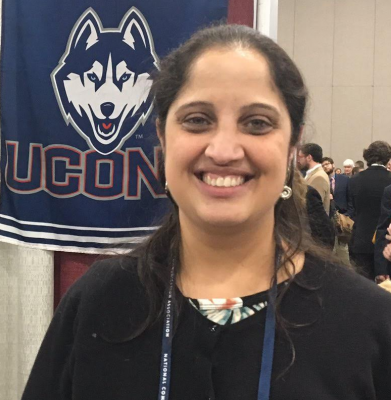
Saraswathi (Saras) Bellur, PhD
Associate Professor
Department of Communication
University of Connecticut
Saraswathi (Saras) Bellur (Ph.D., Penn State University, 2012) is an Associate Professor in the Department of Communication, University of Connecticut (UConn). Situated in media effects, Dr. Bellur’s research focuses on understanding the psychological and physiological effects of interactive media on key communication processes and outcomes. With several publications in flagship journals in the field, Dr. Bellur’s work has contributed to both theoretical and empirical body of knowledge surrounding interactivity research. Dr. Bellur’s research has also focused on explication and measurement issues related to interactivity, cognitive heuristics and user engagement. Dr. Bellur has co-developed a new theoretical framework called the motivational technology model, which examines how we can harness unique affordances of new media, such as interactivity, to boost individual’s intrinsic motivation, and encourage them to engage in preventive health behaviors. Her recent work has also examined the effects of media multitasking on learning and enjoyment. Dr. Bellur looks forward to pursuing innovative and collaborative projects that contribute toward a theory-driven understanding of communication technologies and their effects.

Associate Professor
Department of Communication
University of Connecticut
Dr. Jocelyn Steinke is an associate professor in the Department of Communication at the University of Connecticut. She has served as PI for two and Co-PI for one National Science Foundation grant-funded projects. Her research focuses on the influence of media images of STEM professionals on adolescent girls’ interest in STEM and STEM identity development. She is an American Association for the Advancement of Science (AAAS) fellow, serves on the Science Communication Editorial Board, and has served as an advisory board member and consultant for several NSF-funded projects. Dr. Steinke’s research has been published in a range of interdisciplinary journals including, Journal of Women and Minorities in Science and Engineering, Science Communication, International Journal of Gender, Science and Technology, Journal of Broadcasting and Electronic Media, and Journalism Educator. She has served as an expert source, commenting on research on gender disparities in STEM featured in The Atlantic, The Washington Post, The Chicago Tribune, The Chronicle of Higher Education, Pacific Standard, and other publications. She received an A.B. degree in Biology and English from Mount Holyoke College, M.P.S. degree in Communication from Cornell University, and Ph.D. degree in Journalism and Mass Communication from the University of Wisconsin-Madison.
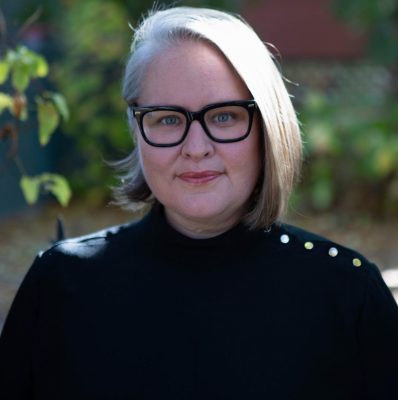
Assistant Professor
Public Health Sciences
University of Connecticut School of Medicine
Megan O’Grady is an Assistant Professor of Public Health Sciences at the University of Connecticut School of Medicine. Dr. O’Grady is an applied social psychologist and health services researcher. Her research and evaluation program aims to improve the system of care for and prevention of substance use disorders and focuses on three main areas: 1) implementation of integrated care practices, 2) development and implementation of technology tools for health and addiction care settings, and 3) quality improvement and systems-level interventions. She is currently a co-investigator on 4 NIH-funded studies focused on the implementation of substance use services and system-level quality improvements. Dr. O’Grady also provides evaluation support and technical assistance on SAMHSA- and State-funded projects in partnership with New York State and the State of Connecticut. In addition, she serves as a lead in the Center for Prevention Evaluation and Statistics at UConn Health. She received her PhD from Colorado State University and completed a post-doctoral research fellowship at the University of Connecticut School of Medicine Alcohol Research Center.

Academic Specialist
School of Social Work
University of Connecticut
Marcus Stallworth, LMSW, operates with a strength based, hands on approach. Spending close to 20 years providing Child Protective Services, he is recognized by the State of Connecticut as an expert witness for providing testimony. He has spearheaded several initiatives to promote the engagement of Fathers, the prevention of abuse and neglect, and the dangers of social media. He has direct experience educating and supporting Human Trafficking and Sexually Exploited victims, including those in Foster Care. He played a leadership role in Connecticut’s Disaster Behavioral Health Response Network and oversaw recovery efforts in Newtown CT after the events on December 14, 2012. Marcus is the Director of Training and Implementation for the Child Welfare League of America. He is also co-owner of Welcome 2 Reality, LLC which focuses on providing media literacy and education for students and parents regarding social media and technology. Stallworth and his team are credited for getting Public Act 17-67 passed into law Connecticut, mandating steps be taken to provide Social Media Literacy education be taught in all public schools. He developed and taught a self-created elective entitled: “Social Media: The Good, Bad, and the Ugly” at the University of Bridgeport. He has taught courses at Post University, the University of Connecticut, the University of South Florida, and currently teaches in Fordham University’s Graduate School of Social Work. Marcus serves as the Vice President of the Board of Directors for Connecticut’s Court Appointed Special Advocates (CASA) and plays a leadership role in Connecticut’s Media Literacy Advisory Council.

Assistant Professor
Department of Communication
University of Connecticut
Jiyoun Suk is an Assistant Professor in the Department of Communication at the University of Connecticut. She is also a core faculty member of the Program of Women’s, Gender, and Sexuality Studies. In her research, she looks at how the communication processes in the contemporary media environment shape social trust, activism, and political polarization, primarily employing computational methods. Her primary line of research examines the role of networked communications in bringing out voices of social justice and equality, as in the case of the #MeToo movement. She currently looks at how digital activism is contextualized across specific geographies and social media platforms. She holds a doctoral degree in Mass Communications from the School of Journalism and Mass Communication at the University of Wisconsin-Madison.

Professor
Department of Human Development and Family Sciences
University of Connecticut
Dr. Rebecca Puhl is Professor of Human Development & Family Sciences at the University of Connecticut. She is also the Deputy Director of the Rudd Center for Food Policy and Health where she leads research and policy efforts aimed at reducing weight-based stigma and discrimination. Dr. Puhl received her Ph.D. in Clinical Psychology from Yale University. She has authored more than 160 research articles on topics including weight-based bullying in youth, the impact of weight stigma on health, weight stigma in health care and the media, and policy strategies to reduce weight-based bullying and discrimination. As a national research expert on weight stigma, Dr. Puhl has testified in legislative hearings on weight discrimination and routinely provides expertise on strategies to reduce weight stigma to national and international health organizations. She has also developed evidence-based trainings to reduce weight bias in health care that have been implemented in medical facilities across the U.S., and her work is frequently cited in the U.S. national media. Dr. Puhl has received multiple national awards for her research, from organizations like the National Eating Disorders Coalition, the Obesity Action Coalition, and The Obesity Society who selected Dr. Puhl as the recipient of the national scientific achievement award for excellence in an established research career. She was also the inaugural recipient of the Faculty Excellence in Research Award in Public Scholarship at the University of Connecticut. You can visit www.uconnruddcenter.org for more information about Dr. Puhl’s work.

Associate Professor
Department of Communication
University of Connecticut
Rory McGloin, Ph.D. is an award-winning communication professor at the University of Connecticut. Rory’s career in higher education spans 15+ years, including engagements with over 10,000 learners to date and 31 peer-reviewed journal publications. During this time, Rory has curated a wealth of knowledge on how the process of communication impacts every element of our lives. Rory’s current work is focused on the use of communication best practices in organizational training and development programs. Rory’s mission is centered around the improvement of employees’ communication skills through an increased value of communication. Rory is also an entrepreneur who owns and operates his own communication consulting firm, in which he shares his expertise with organizations seeking to engage in meaningful transformations through the power and value of effective communication.
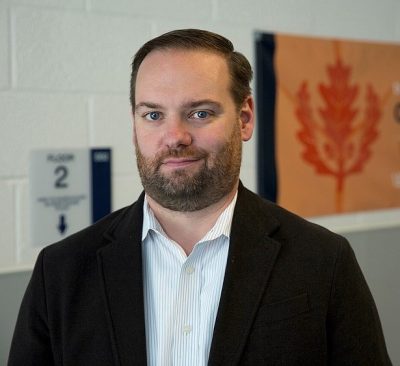
Professor
Department of Communication
University of Connecticut
Dr. Lachlan is a Professor and Head of the Department of Communication at the University of Connecticut. His research centers on the uses and impact of social media and other information resources in the management of large scale disasters and crises. Recent federally funded projects have included an examination of the impact of disaster media use on mental health, and media dependencies associated with the COVID pandemic and their impact on protective action. He was the editor of Communication Studies from 2016 to 2018, and is the incoming editor of Journal of International Crisis and Risk Communication Research.
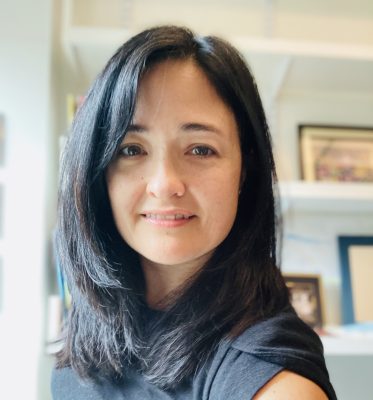
Associate Professor
Department of Journalism
University of Connecticut
Marie K. Shanahan is an associate professor and head of the Department of Journalism at UConn. Her academic research and teaching focus on the intersection of journalism and digital communication technology. She studies trends in digital discourse — particularly online commenting on news sites and social media, misinformation and news literacy. She is the author of Journalism, Online Comments, and the Future of Public Discourse (Routledge, 2018). She has worked as a news reporter, online producer and digital editor for more than 20 years. Prof. Shanahan was selected as a Fulbright U.S. Scholar in 2020-21. In 2022, she will work with faculty and students in Tacloban, Leyte, Philippines to study how local news organizations are combating – or contributing to – the online spread of inaccurate or deliberately deceptive information under the guise of news. Prof. Shanahan also serves on the board of directors of three non-profit organizations: Connecticut Health Investigative Team, Connecticut Foundation for Open Government and The Connecticut Mirror.
Professor
Department of Communication
University of Connecticut
Carolyn A. Lin is a professor in the department of Communication at the University of Connecticut. She is an advisory board member of UConn’s Environmental Studies program and a research affiliate with the Connecticut Institute for Resilience & Climate Adaptation, Connecticut Transportation Institute, and the Institute for Collaboration on Health, Intervention, and Policy, in addition to serving as an advisor for UConn’s Health Family Connecticut program. Her research and teaching interest focus on strategic, risk and science communication in the marketing, public health, climate change, public opinion, intercultural competence, and human-computer interaction contexts. She is the founder of AEJMC’s Communication Technology Division. Her research has been funded by NIH and NSF, among others. She is experienced in designing interactive informatics tools for risk communication. Her current research addresses utilizing augmented reality, mobile devices, and biometrics to cultivate and enhance public engagement with climate change and environmental health issues. As a recipient of a University Distinguished Research Faculty award, she has been ranked among the top 2% most cited scientists in the world in a 2020 study published by Stanford University researchers.

Assistant Professor-in-Residence of Higher Education and Student Affairs
Neag School of Education
University of Connecticut
Dr. McCready is an Assistant Professor-in-Residence of Higher Education and Student Affairs in the Department of Educational Leadership in the University of Connecticut Neag School of Education. Prior to his faculty career, Adam worked as a higher education and student affairs professional for more than a decade. His research examines the college student experience with the intent of identifying and challenging oppressive structures in higher education. Relevant to the UConn Center for mHealth and Social Media, his work investigates the encounters of college students of color with racial hostilities on social media, and how these encounters affect student outcomes, including their mental health and perceptions of campus climate. His scholarship has been published in peer reviewed journals such as Research in Higher Education, Measurement and Evaluation in Counseling and Development, Journal of Student Affairs Research and Practice, and Psychology of Men & Masculinities.
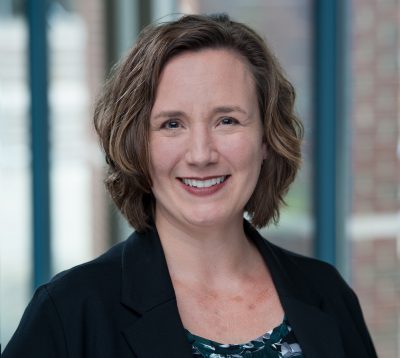
Professor
School of Law
University of Connecticut
Molly K. Land is the Catherine Roraback Professor of Law and Human Rights at the University of Connecticut School of Law. Her research focuses on the intersection of human rights, science, and technology. Her most recent book, New Technologies for Human Rights Law and Practice (CUP 2018, ed. with Jay Aronson) provides an essential roadmap for understanding the relationship between technology and human rights law and practice. Professor Land’s articles have been published in the Yale, Harvard, Virginia, and Michigan journals of international law, among other places, and she speaks and lectures widely on the relationship between technology and human rights. A former Fulbright Scholar at the University of Bonn, Professor Land earned her J.D. at Yale Law School. Professor Land has authored or co-authored several human rights reports, including a report for the Human Rights Center at the American Bar Association on social media harassment of human rights defenders in Guatemala. She has served on the Board of Directors of the Global Network Initiative and the Committee on Scientific Freedom and Responsibility of the American Association for the Advancement of Science.

Professor
Department of Pediatrics and Psychiatry
University of Connecticut School of Medicine
Dr. Christine McCauley Ohannessian has served on the faculty at the University of Texas, the University of Delaware, the University of Connecticut School of Medicine, and Florida State University. Dr. Ohannessian’s research focuses on adolescent and emerging adulthood psychological health. She is especially interested in social media use and its association with internalizing problems and substance abuse. Currently, Dr. Ohannessian is the Editor of Emerging Adulthood. She also has served as Associate Editor for the Journal of Early Adolescence, and as Field Editor for the Journal of Studies on Alcohol and Drugs. Dr. Ohannessian’s research has been funded by NIH, NSF, and private foundations and has been featured in TIME Magazine, Parade Magazine, Yahoo!life, NBC news, and Vice Media.

Professor
Department of Psychiatry
University of Connecticut Health Center
Jayesh Kamath is a Professor of Psychiatry and Immunology at the University of Connecticut Health Center. He is the Research Director of the Mood & Anxiety program at the UConn Health center and also leads the Cancer Supportive Care clinic at the Neag Comprehensive Cancer Center. Dr. Kamath’s research interests include investigation of interactions between the psycho-neuro-endocrine-immunological systems, psychopharmacological management of psychiatric disorders, and use of mobile health (mHealth) technology in the management of psychiatric disorders. He is the recipient of several grants in these areas including grants funded by the National Institute of mental Health (NIMH) and National Science Foundation (NSF). He is currently leading several industry-sponsored clinical trials with established and investigational medications for the treatment of mood, anxiety and other psychiatric disorders.
Dr. Kamath is the recipient of several awards including NIH Merit Award from the National Cancer Institute (NCI), NIMH sponsored New Investigator Award, award from the Career Development Institute for Psychiatry, and Outpatient Attending of the Year awards (2010, 2011 and 2012). He is an active member of the Cancer Supportive Care Editorial Board at the National Cancer Institute (NCI) and has served on the NSF grants review panels. At UConn Health, he serves on the Cancer Committee and the Scientific Advisory Committee (SAC). He served on the President’s Mental Health Task Force for UConn students and is currently serving on the Wellness Coalition Advisory Board for student mental health. Dr. Kamath teaches seminars for medical students and psychiatry residents and supervises psychiatry residents and psychology interns in outpatient clinics at the UConn Health.

Assistant Professor
Department of Communication
University of Connecticut
Dr. Shardé M. Davis is an Assistant Professor in the Department of Communication and Faculty Affiliate of various research institutes at the University of Connecticut. Her research examines the way Black women leverage communication in the sistah circle to invoke collective identity, erect and fortify the boundaries around their homeplace, and backfill the necessary resources to return to white/male dominant spaces in American society. These ideas have been published in over 40 peer-refereed articles and invited book chapters, and are best represented in her theory, The Strong Black Woman Collective. Her research was formally recognized with the 2018 American Postdoctoral Fellowship from the American Association of University Women and the 2019 Ford Foundation Postdoctoral Fellowship. In addition to her program of research, Dr. Davis created the viral Twitter Hashtag #BlackintheIvory, which extended a timely opportunity for Blackademic TRUTHtellers to share personal instances (and engage in necessary conversations) about anti-Black racism in academia. She is also the inaugural recipient of the 2021-2022 Faculty of Color Working Group Fellowship funded by the Andrew W. Mellon Foundation to edit a new book for #BlackintheIvory that is set to publish in 2023 by the University of North Carolina Press.
Associate Professor
Department of Psychiatry
University of Connecticut Health Center
Wizdom Powell is Director of the Health Disparities Institute and Associate Professor of Psychiatry at The University of Connecticut. Formerly, Dr. Powell spent over a decade at UNC-Chapel Hill’s Gillings School of Global Public Health where she held a tenured appointment in the Department of Health Behavior and was Research Associate Professor and Associate Director of the Center for Health Equity Research in the Department of Social Medicine.
In February 2010, Powell gave invited testimony before the President’s Cancer Panel (PCP) on physician communication with minority patients and its impact on their mistrust and use of health care. The PCP used her testimony to recommend national strategies for eliminating cancer disparities to President Obama. In 2011-2012, she was appointed by President Obama to serve as a White House Fellow to Secretary of Defense Leon Panetta. In this role, she provided subject matter expertise on Military Mental Health (e.g., PTSD, Suicide, and Military Sexual Trauma). Her Black American male health outcomes and healthcare inequities. Her work has ignited global interests in the health of men occupying marginalized socioeconomic positions and negotiating mutually constitutive social identity statuses. She is expressly focused on unpacking the contributions made by environmental adversities (e.g., racism) and gender role norms to behavioral health inequities.
She has published numerous peer-reviewed articles and book chapters including ones in the American Journal of Public Health, Journal of General Internal Medicine, Behavioral Medicine, and Child Development. In addition to being a White House Fellow, she is an American Psychological Association (APA) Minority, Robert Wood Johnson Foundation, Kaiser Permanente Burch Leadership, Institute of African American Research, and Ford Foundation Fellow who received a Ph.D. and M.S. in Clinical Psychology and M.P.H. from the University of Michigan-Ann Arbor. She serves as chair of the APA’s workgroup on Health Disparities in Boys and Men and co-chair of the Health Committee for President Obama’s My Brother’s Keeper Initiative in Durham County.
Dr. Powell is an expert in racial trauma, justice, and healing. She leverages this expertise as a consultant. Currently, she serves as the brand consultant for Dove Men+Care, Creative Diversity Director at Headspace Health, and assists organizations, corporate entities, and communities around the world with centering racial equity, justice, and healing in their strategic initiatives. She has also consulted with the Urban Institute and Brookings Institute on initiatives focused on low-income and minoritized males.
She provided invited testimony in 2022 to the House Committee on Ways and Means about America’s Mental Health Crisis. In recognition of her public service to boys and men, she received the American Psychological Association’s (D51) Distinguished Professional Service Award. In 2015, she received the prestigious Phillip and Ruth Hettleman Prize for Outstanding Artistic and Scholarly Achievement by Young Faculty. Dr. Powell was awarded a 2017 academic writing residency at the Bellagio Center from the Rockefeller Foundation. During this highly competitive residency, Dr. Powell worked with other global leaders on collaborative strategies for transforming social and healthcare system landscapes to address gendered health Inequities among vulnerable males. In 2018, she was selected as a Health Innovator Fellow by the Aspen Institute and as a 100 Women of Color honoree. Currently, she serves as President of the Division for the Psychological Study of Men & Masculinities at the APA. Most recently, she was appointed by Hartford, CT Mayor Luke Bronin to serve as Chair of the Public Health Committee for the Hartford COVID-19 Recovery Working Group. She also received the Connecticut Psychological Associations Distinguished Contributions to Psychological Science Award, Ebenezer D. Bassett Distinguished Humanitarian Award, and was named one of the 25 Essential Voices in Black mental health.

Assistant Professor
School of Nursing
University of Connecticut
Dr. Ross’ research focuses on understanding how youth-serving professionals can address adolescents’ sexual and reproductive health (SRH) needs, promote their positive development by using their internal and external assets, and significantly lower the rates of sexually transmitted infections (STIs) and unintended pregnancies. Dr. Ross’ interest involves health promotion and risk reduction among vulnerable adolescents locally and globally, SRH, and health disparities. Her goal is to develop culturally sensitive trauma-informed interventions to address the elevated rates of STIs and unintended teenage pregnancy that disproportionately affects youth of color and ensure vulnerable youth have equal access to quality health care. Dr. Ross has a passion for global health and was the 2018 NIH Minority Health International Research Training Grant Scholar. She mentored undergraduate students from the United States and South Africa and researched alcohol use and its impact on SRH and relationships among young adults in South Africa. Her most recent study examined Female African American adolescents’ perspectives regarding their SRH needs while in foster care. Dr. Ross brings a unique cultural lens to addressing health disparities based on her experience working in Guyana, Antigua, St. Kitts and Nevis, Guatemala, and South Africa. Dr. Ross is currently working on a study to develop, implement, and test the feasibility and efficacy, of a culturally sensitive trauma-informed mobile health approach to promote SRH and sexual self-efficacy among female African American adolescents in foster care.
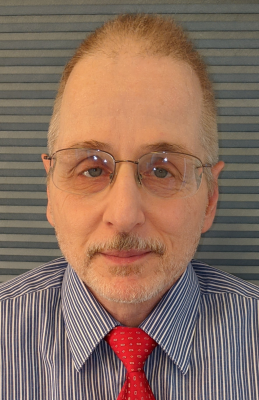
Professor
Department of Computer Science and Engineering
University of Connecticut
Dr. Steven A. Demurjian is a full professor of the Computer Science & Engineering at the Univ. of Connecticut, and has been at UConn since 1987. In terms of publications, Dr. Demurjian has over 185 archival publications, in the following categories: 1 book, 2 edited collections, 77 journal articles and book chapters, and 108 refereed conference/workshop articles. Dr. Steven A. Demurjian has established an international reputation in the areas of: role-based (RBAC), Lattice-Based (LBA), mandatory (MAC), and discretionary (DAC) access control with assurance and automatic generation of security enforcement software for UML, XML, Mobile Computing, and Cloud Computing; Biomedical Informatics and Software Architectures for Health Information Exchange; Adaptive Trust Negotiation for Time-Critical Access to Healthcare Data; and, extending the Fast Healthcare Interoperability Resources (FHIR) with a new Pattern Definition resource to support design patterns in the HL7 standard.
Dr. Demurjian has total funding of all of these efforts is over $4 million, with Dr. Demurjian’s share of over $2.5` million. In the security area, Dr. Demurjian has made scientific contributions related to security for secure-cross domain protocols (PI: Sonalysts, Phase I, Phase II, and Phase II extension, AFOSR), for agent-based systems and distributed environments (co-PI: AFOSR) and homeland security (co-PI: DARPA), and engineering contributions related to security for networks (co-PI: Sonalysts – Phase I and Phase II STTR from Dept. of Homeland Security) and web-portals/WIKIs (PI: Serebrum – Phase I SBIR from Dept. of Navy). From 1999 to 2017, Dr. Demurjian has co-led a major initiative for information systems reengineering for the State of Connecticut Insurance Department, providing expertise in the area of software, web-based, and client/server architectures, and recommending software development processes and technologies to facilitate these efforts.). Dr. Demurjian has supervised 15 doctoral and 49 Masters students to comply for role-based (RBAC), mandatory (MAC), and discretionary (DAC) access control with assurance and automatic generation of security enforcement software.
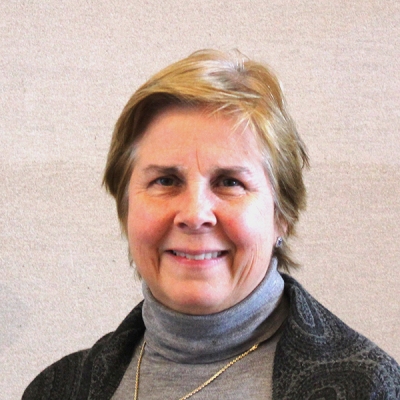
Professor
Department of Allied Health Sciences
University of Connecticut
Dr. Valerie Duffy is a Professor and Director of the Graduate Program in the Department of Allied Health Sciences. She offers a wealth of experience in food, nutrition, health promotion, and public health nutrition. Her research program has two main areas fueled by extramural funding. First, her team aims to understand sensory nutrition or the influence of variation in chemosensory perception on food flavor, food preference, and consumption. Recently, her team has translated sensory nutrition into individualized dietary recommendations for children and adults through online survey and tailored nutrition messages. The ultimate goal is to leverage sensory nutrition to encourage consumption of healthy diets that are enjoyable for promotion of health and prevention of disease. Her second major area of research interest involves the formation of interdisciplinary teams to work with community agencies to promote health diets and weights of children and their families, particularly those of economic disadvantage. These efforts incorporate undergraduate and graduate student research and investigate the effectiveness of community-based interventions, mhealth, and social media to improve diet healthiness for obesity prevention. Dr. Duffy and her students have published numerous papers and have presented at national and international meetings. She has received several awards for excellence in teaching, research, and service. Students who have trained in her lab are advancing health promotion through research, practice, and leadership. She has served as major advisor to complete fifty-one Master’s students, four PhD students, and numerous undergraduates completing research experiences and honor thesis.

Professor
Center for Quantitative Medicine
University of Connecticut
Dr. Agresta is a seasoned family physician and clinical informatics, educator, administrator, researcher and innovator with a history of bringing together multidisciplinary teams to focus on developing novel methods for creating, using and evaluating technology in both clinical and teaching settings. He has a bachelors in biomedical engineering from Stevens Institute of Technology, a medical degree from New Jersey Medical School and a masters in biomedical informatics from Oregon Health Sciences University. He oversees the Electronic Medical Record for the Family Medicine residency clinic and has held state level leadership roles in adoption and implementation for Health Information Exchange and Electronic Health Records. He also served as the section leader for Informatics in the Connecticut Institute for Primary Care Innovation, a joint venture between the University of Connecticut and St. Francis Hospital. He has research interests in using technology to enhance the care of patients as well as the experience and efficiency of providers. He currently leads the Health Interoperability, Innovation and Learning lab, which is focused on providing education, outreach and research focused on technology enabled healthcare delivery.

Professor
Department of Allied Health Sciences
University of Connecticut
Dr. Michael Copenhaver is a Professor of Health Promotion in the Department of Allied Health Sciences and a Licensed Clinical Psychologist. He is also a Principal Investigator at the Institute for Collaboration on Health, Intervention, and Policy (InCHIP) with an active program of addiction-related research. Since coming to UConn in 2002, Dr. Copenhaver has been continuously funded by NIH grants involving the development and implementation of evidence-based HIV prevention strategies. His work emphasizes tailoring behavioral interventions for optimal use in community-based settings, like drug treatment programs where priority populations can be readily reached. His most recent randomized trial targets opioid-dependent adults using a bio-behavioral approach that integrates pre-exposure prophylaxis (PrEP) and an evidence-based behavioral intervention designed to prevent HIV among high-risk opioid-dependent persons in clinical care. He teaches research-focused courses at the undergraduate and graduate levels in addition to mentoring honors students and supervising independent studies. Dr. Copenhaver takes an active role in the PhD in Health Promotion Sciences program and also mentors students from other disciplines and programs at the Masters, PhD, and post-doctoral levels.

Assistant Professor in-Residence
Digital Media & Design
University of Connecticut
Using the latest social & digital media analytics platforms and technologies, John Murphy assists Fortune 500 companies, small businesses, nonprofits, political candidates, advocacy organizations, and individuals with everything from the creation of a digital or social media department to discovering new ways to leverage data for increased productivity. He translates social and digital media data and analytics into a story and explains how that story can be used to inform overall strategy as well as content creation, engagement, and department structure.
John’s professional passion is creating, leading, and partnering with digital media teams to harness the positive potential of social media. He also practices and teaches yoga, and surfs whenever he can get to the ocean. John is the founder of UConn DMD’s Social Media Analytics Commands Center (SMACC).
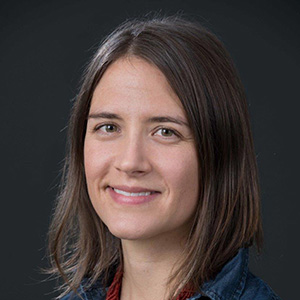
Associate Professor
School of Social Work
University of Connecticut
Dr. Caitlin Elsaesser is an Associate Professor at the University of Connecticut School of Social Work. She is a licensed clinical social worker and completed her MSW and Ph.D. from the University of Chicago School of Social Service Administration. The overarching goal of Dr. Elsaesser’s work is to partner with youth and communities to create health promotion efforts that are empowering and accessible. Dr. Elsaesser’s work is guided by critical race and feminist theories. With an understanding that those with lived experience hold key expertise in health, her work draws on community-based participatory methodology. Her career as a researcher is built on a decade of direct experience working with adolescents and families in Chicago, first as a high school teacher and later as a social worker. Caitlin is currently the Principal Investigator of a CDC-funded K01 Mentored Research Scientist Development Award. Working in partnership with Hartford violence prevention agencies as well as youth co-researchers, this project will design the core components of health supports for youth to navigate social media conflict implicated in offline violence. The work builds on Caitlin’s past community-partnered research focused on cyberbanging, an emerging form of youth violence occurring on social media, also implicated in other forms of youth violence. In partnership with a Hartford-based youth development agency, she developed a measure of cyberbanging, critical to understanding the connection between cyberbanging and youth violence, as well as to identifying mechanisms for intervention.

Professor
Computer Science & Engineering Department
University of Connecticut
Dr. Bing Wang is a Professor in the Computer Science & Engineering Department at the University of Connecticut. Her main research areas are broadly in computer networking and distributed systems. One of her research interests is using sensory data collected from smartphones and wearables and machine learning for innovative smart health applications.

Associate Professor
Computer Science and Engineering
University of Connecticut
Dr. Gokhale has extensive experience in the mining and analysis of social media content to gain insights into socially and culturally sensitive issues such as masks, Covid-19 vaccine, climate change, vaccine passports, and hateful, offensive, and anti-government speech. She is currently collaborating with Prof. Richard Wilson from the School of Law to build a computational approach to identify anti-human rights speech from Twitter conversations in Colombia. She also has experience in building statistical and machine learning models based on health data, such as the 500 cities, and National Survey on Drug Use and Health. In the mHealth space, Dr. Gokhale is collaborating with Dr. Elizabeth Gromisch of Trinity Health, and Dr. Thomas Agresta from UConn School of Medicine to build a mobile application for self-management of Multiple Sclerosis.
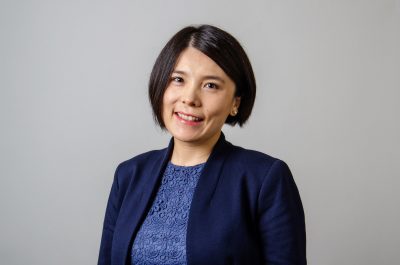
Associate Professor
Department of Communication
University of Connecticut
Dr. Zexin “Marsha” Ma (Ph.D., University of Maryland, 2018) is an Assistant Professor in the Department of Communication. Ma conducts research at the intersection of health communication, persuasion, and media psychology. She is particularly interested in understanding the processing and persuasive effects of health narratives. Her current projects include developing and testing the effectiveness of narrative pictorial warning labels to communicate health risks, determining the impact of emerging media (e.g., VR, AR) on narrative influence, understanding online health-related narrative misinformation, and identifying the role of narratives in countering misinformation. Ma has published over 30 peer-reviewed journal articles and currently serves as the Principal Investigator on an NIH-funded project on alcohol and cancer communication.
ACADEMIC PARTNERS

Associate Professor
WPI Computer Science
Emmanuel Agu is currently an associate professor in the computer science department at WPI having received his Masters and PhD in electrical and computer engineering at the University of Massachusetts at Amherst. His research interests are in the areas of computer graphics, mobile computing, and wireless networks. He is especially interested in research into how to use a smartphone as a platform to deliver better healthcare. In collaboration with researchers at WPI and at UMass Medical School, he is currently working on an NSF research project that will design and develop a mobile application for advanced diabetes and wound care management for users with foot ulcers. His research has been funded by the NSF, the US department of education, US Army Research Labs, Google, Nvidia and AMD. His research has been published in various ACM and IEEE conferences.

David Atkin, PhD
Department of Communication
University of Connecticut
Dr. Atkin’s research interests include the uses and effects of new media – including a current project investigating uses of the Internet for health information. In 1999, Dr. Atkin received the Kreighbaum Under 40 Award, recognizing the field’s top junior journal scholar, and in 2000, he received a University Distinguished Scholar Award. He has taught courses on communication and campaigns, in addition to doing research on the diffusion of new media technologies. He has worked on research grants and contracts supported by the Ameritech Foundation, Cleveland State University, Crowell and Moring Attorneys at Law, the National Association of Broadcasters, Northern Telecom University Interaction Program and the U.S. Departments of Agriculture and Education. Dr. Atkin also serves on the editorial boards of Journal of Broadcasting & Electronic Media and Journalism & Mass Communication Quarterly & the American Journal of Media Psychology.

Professor
Department of Medicine
UMass Medical School
Dr. Boudreaux is a Clinical Psychologist and Professor of Emergency Medicine, Psychiatry, and Quantitative Health Sciences at the University of Massachusetts Medical School. He is Vice Chair for Research in the Department of Emergency Medicine. He has extensive experience with applying ecological momentary assessments (EMA) with medical patients. He has recently completed a NIDA funded study that created a cell phone- delivered, interactive voice response EMA assessment for cardiac patients who smoked cigarettes. He is particularly interested in measuring how affective and stress states influence health behaviors.

Associate Professor
Laval University School of Nutrition
Dr. Sophie Desroches, PhD, RD, is an Associate Professor at the School of Nutrition of Laval University, in Quebec City, Canada. She is also a research scientist at the Institute of Nutrition and Functional Foods and at the Population Health and Optimal Health Practices Research Unit, Centre hospitalier universitaire de Quebec (CHU de Quebec), of Laval University. Her research program aims to study the conceptual, methodological and practical bases for developing and evaluating knowledge translation strategies that will optimize adherence to dietary advice. She is the lead author of the Cochrane systematic review “Interventions for enhancing adherence to dietary advice for preventing and managing chronic diseases”. Her more recently funded research projects have explored shared decision making in nutrition counseling, and the use of social media, and more specifically blogs, as knowledge translation strategies to enhance adherence to evidence-based dietary advice for preventing and managing chronic diseases.

Professor
Department of Medicine
UMass Medical School
Dr. Pbert is a Professor of Medicine, Associate Chief of the Division of Preventive and Behavioral Medicine at the University of Massachusetts Medical School, and founder and Director of the Center for Tobacco Treatment Research and Training (CTTRT). She is a Clinical Psychologist and clinical and translational researcher specializing in tobacco and obesity prevention and treatment, optimizing organization and health care systems to improve delivery of health care services, development and evaluation of clinician-delivered behavior-change interventions protocols, and chronic care management. Dr. Pbert has an interest in the use of technology to enhance the reach, acceptability, and effectiveness of health behavior change interventions, particularly in adolescent and difficult to reach populations. Current related work includes the use of a smartphone app to help adolescent smokers learn and apply mindfulness in their efforts to quit, and the use of the photovoice method to enhance the design, content and delivery of patient navigation linking low SES and minority patients with tobacco treatment. Dr. Pbert is involved in multiple national and international collaborations and has been continuously funded by NIH for her research programs. She is a Fellow of the Society of Behavioral Medicine and was elected to the Academy of Behavioral Medicine Research for her national and international behavioral medicine research work.

Professor
Department of Medicine
UMass Medical School
Dr. Milagros C. Rosal is a Professor in the Division of Preventive and Behavioral Medicine in the Department of Medicine at the University of Massachusetts Medical School, and a faculty member in theh Clinical and Population Health Research Ph.D. Program. Dr. Rosal is a health disparities researcher specializing in clinical trials of health behavior change interventions that address cultural preferences and literacy needs of socio-economically disadvantaged and racial/ethnic minority populations at risk for obesity and obesity-related chronic diseases. Dr. Rosal has content expertise in the areas of diabetes, cardiovascular conditions, gestational weight gain and post-partum weight loss, adherence to cancer screening recommendations, psychosocial influences on health, and health care utilization. Dr. Rosal has an interest in the use of technology for increasing the reach of behavioral interventions to populations that bear the burden of health disparities click here and here for recent publications. Dr. Rosal directs the Research Center for Behavior and Community Health Solutions in the Division of Preventive and Behavioral Medicine. She is Co-Director of the CDC-funded UMass Worcester Prevention Research Center (PRC), and Co-PI of the NIH/NIMHD Center for Health Equity Intervention Research, funded by the National Institute of Minority Health and Health Disparities. Dr. Rosal is involved in several national and international collaborations and her research has been funded by the National Institutes of Health, the Centers for Disease Control and the Robert Wood Johnson Foundation. Dr. Rosal is a fellow of the Society of Behavioral Medicine, and a member of several professional organizations, including the American Heart Association and the American Diabetes Association.

Associate Professor
WPI Computer Science
Carolina Ruiz’s research interests are in data mining, machine learning, and artificial intelligence. Together with her graduate and undergraduate students, colleagues in computer science and biology, and medical doctors, Ruiz investigates and develops data mining algorithms for genomics and for clinical medicine. In addition to being a faculty member in computer science, she is a founder and active member of the bioinformatics and computational biology program at WPI. She enjoys teaching courses, and advising undergraduate and graduate research projects in data mining and machine learning.

Bengisu Tulu, PhD
Associate Professor
WPI School of Business
Areas of expertise include design and development of health information technologies, implementation of health information technologies, and implications of health information technologies on healthcare organizations and consumers.






